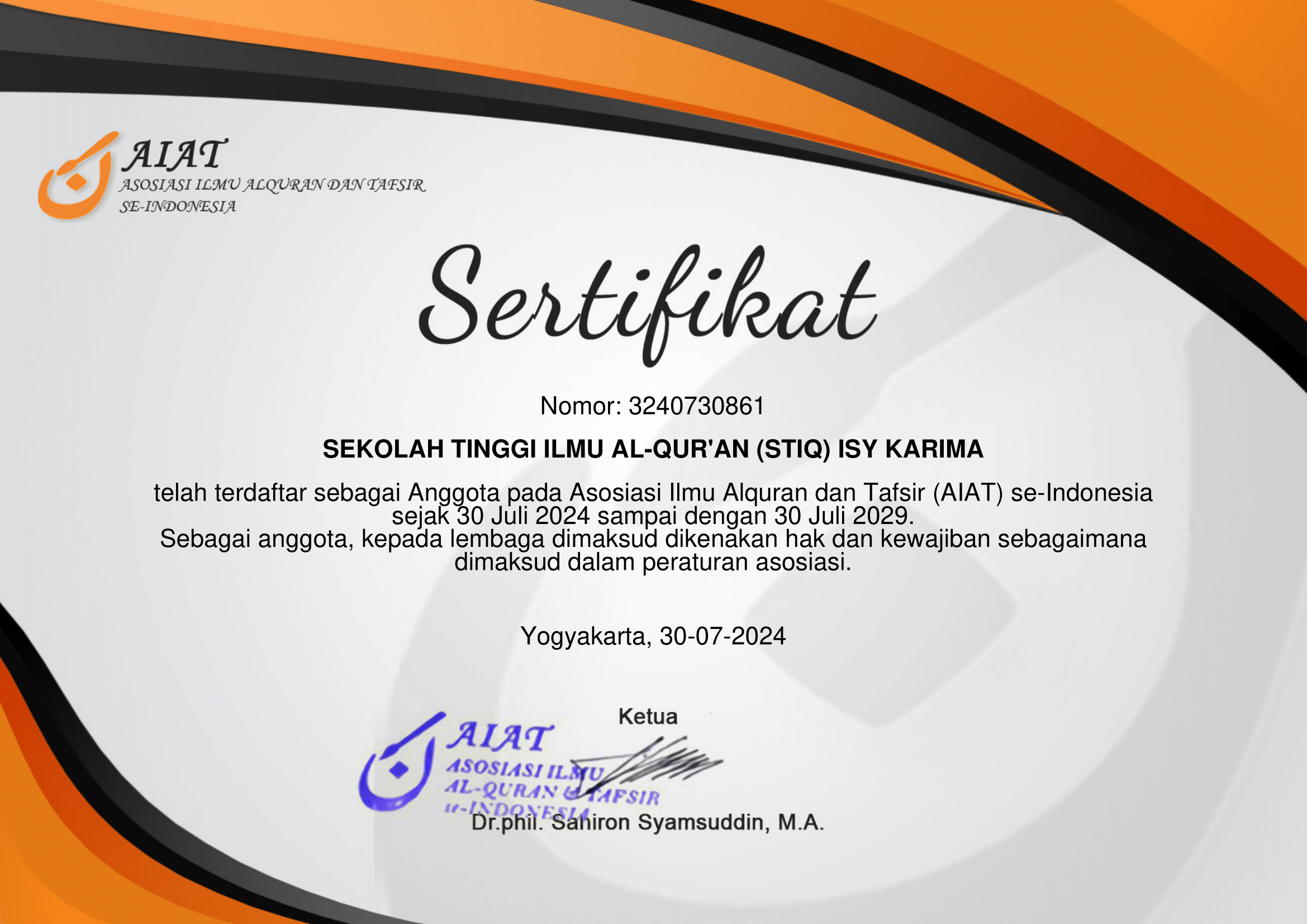Quo Vadis I'jaz 'Ilmi : Karakteristik dan Persinggungannya dengan Fakta Sains
DOI:
https://doi.org/10.58438/alkarima.v8i1.195Keywords:
I'jaz ilmi, tafsir ilmi, Al Qur'an, karakteristik, sainsAbstract
This study aims to examine the development of the study of i'jaz ilmi and the signs that must be considered so that the study of i'jaz ilmi does not deviate. The focus of this study consists of several important points, namely the development of tafsir ilmi and its characteristics, a critical study of the definition of i'jaz ilmi and tafsir ilmi that developed in the community, and the signs in the study of i'jaz ilmi so that no mistakes occur. This research uses qualitative-descriptive-analytic methodology. Based on the research, it is found that: First, Despite the pros and cons among scholars, i'jaz and tafsir ilmi is one of the studies of the Qur'an that is widely discussed by scholars, this is evident from the emergence of several works related to it, including in Indonesia. Second, some scholars argue that i'jaz ilmi and tafsir ilmi are two different things, this difference lies in the potential error that will occur. I'jaz ilmi is considered a definite truth while tafsir ilmi has the possibility of error. However, in practice i'jaz ilmi also has the possibility of being wrong as long as there is no explicit signal that shows the relationship of a verse with scientific facts, meaning that if the condition is so then i'jaz ilmi and tafsir ilmi are only based on conjectures that have the possibility of being wrong. Third, to minimize the occurrence of errors, it is necessary to pay attention to some of the signs in the study, namely the use of sentences that can be used in the study.
Downloads
References
Al-Farmawi, Abdul Hayy, 1977, Al-Bidayah fi al-Tafsir al-Maudhu’i. Kairo: Maktabah Jumhuriyah.
Al-Mushlih, Abdullah bin Abdil Aziz, Al-I’jaz al-Ilmi fi al-Quran wa as-Sunnah Tarikhuhu wa Dhawabithuhu, Makkah: Haiah Alamiyah li I’jazi al-Quran was Sunnah.
Asror, Mahfudhil, 2019, Mengeksplanasi Mukjizat al-Quran. Jurnal al-I’jaz. Vol 1. No 1.
Ath-Thayyar, Musa’id bin Sulaiman, 1433 H., Al-I’jaz al-‘Ilmi ila ‘Ayna. Riyadh. Dar Ibnu al-Jauzi.
Illiya, Anzah Muhimatul, 2019, I’jaz Ilmy al-Quran dalam Penggunaan Kata Sama’ dan Bashar, Jurnal Refleksi, Vol 18, No 2.
Jibril, Muhammad Sayyid, 2008, ‘Inayatul Muslimin fi Ibrazi Wujuh al-I’jaz fi al-Quran al-Karim. Madinah, cetakan Malik Fahd, hlm 35.
Judai’, Abdullah ibn Yusuf, 2008, Al-Muqaddimaat al-Asasiyyah. Beirut: Muassasah Rayyan.
Laila, Izzatul, 2014, Penafsiran Al-Qur’an Berbasis Ilmu Pengetahuan, dalam Jurnal Epistemé, Vol. 9, No. 1.
Muchlisin, A.R & Nisa, K., 2017, Geliat Tafsir ‘Ilmi di Indonesia dari Tafsir Al-Nur hingga Tafsir Salman. Millat?, Journal of Islamic Studies and Humanities, Vol. 2, No. 2.
Muhrif bin Abdul Aziz, 2010, At-Tafsir wa I’jaz al-‘Ilmi fi al-Quran al-Karim, Dar Muhammad al-Amin.
Muslim, Musthafa, 2005, Mabahits fi i’jaz al-Quran. Damaskus: Dar al-Qalam.
Nathir K.A.M., & Othman M.S., 2021, I’jaz Bayaniy dan Perkembangan Kajian Menerusi al-Quran. al-Abqari: Journal of Islamic Social Sciences and Humanities, Vol. 24.
Prabowo, Arif, 2022, Konsep Mukjizat Menurut Islam dan Kristen, Edu Society: Jurnal Pendidikan, Ilmu Sosial, dan Pengabdian Kepada Masyarakat, Vol. 2, No. 3.
Prakoso, Theo Jaka, 2017, Gejala dan Fenomena Bahr dalam al-Quran: Relasi I’jaz al-Quran Terhadap Ilmu Pengetahuan. al-Dzikra: Jurnal Studi Ilmu al-Quran dan al-Hadits. Vol 11.
Sayaka, Dwi Sukmanila & Arni, Jani, 2016. Evidences of Scientific Miracle of aL-Quran in The Modern Era. Jurnal Ushuluddin. Universitas Islam Negeri Sultan Syarif Kasim. Vol 24. No 1.
Sulthoni, Akhmad, 2020, Ad-Dakhil dalam Penafsiran al-Quran, Mengenal Infiltrasi dalam Penafsiran al-Quran, Kurnia Kalam Semesta: Yogyakarta.
Tim Perumus Majelis al-A’la li Syu’un al-Islamiyyah, 2003, Al-Mausu’ah al-Quraniyyah al-Mutakhashishah. Mesir. Majelis al-A’la li Syu’un al-Islamiyyah.
https://mizanstore.com/ayat-ayat_semesta_-_new_53361#tab-2. Diakses pada 21/12/2023. 11:01 WIB.
Downloads
Published
How to Cite
Issue
Section
License
Copyright (c) 2024 Shohib Khoiri, Akhmad Sulthoni

This work is licensed under a Creative Commons Attribution-ShareAlike 4.0 International License.
This work is licensed under a Creative Commons Attribution-ShareAlike 4.0 International License.












